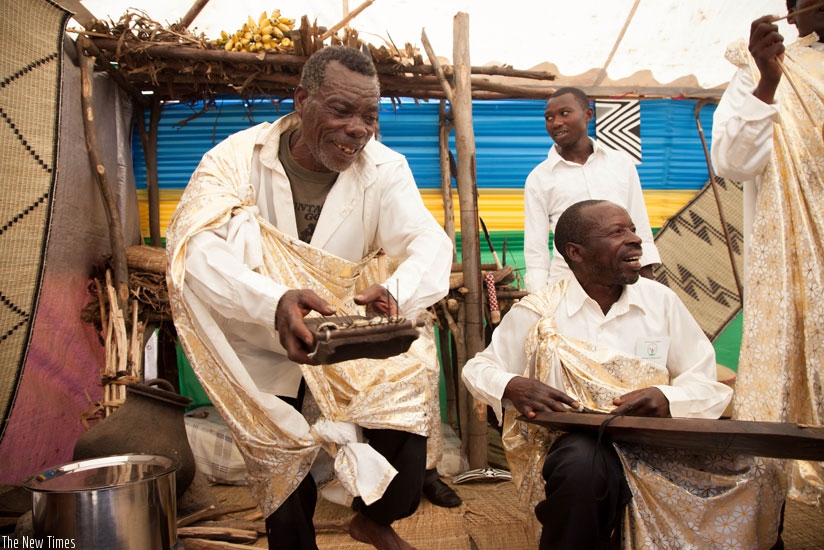The first time I attended Igitaramo event at Uburanga Arts Center in Kimihurura was almost four months back, I was enthralled. It was as if I was experiencing Rwanda traditional culture for the first time. The music was riveting.


The first time I attended Igitaramo event at Uburanga Arts Center in Kimihurura was almost four months back, I was enthralled. It was as if I was experiencing Rwanda traditional culture for the first time. The music was riveting.
The Intore dancers just amazed with their nimbleness and agility. The traditional food was more than delicious.
The traditional beer, though not as intoxicating as what I’m used to was just amazing.
I roasted corn as I sat by the fireside, chatting with strangers I had met for the first time. It was as if I had been transported to another world, a world in which you exchanged freely your smiles with people you’ve never met before. If that was how our ancestors used to live, I said to myself, I would rather be happier living in that world.
When everyone had gone by the dead of the night, I was just more than happy to have enjoyed how our ancestors used to live their lives.
Igitaramo is a kind of rendezvous that takes place at Uburanga Arts Center in Kimihurura at the end of each month. It is an occasion when people of diverse cultures come together to share their stories just as it used to be during the time of our ancestors.
I travelled along the cobblestone street behind Lemigo Hotel going to Uburanga Arts Center to look for one Augustine Hakizimana, one of the brains behind "modern Igitaramo” that normally takes place at the famous arts center.
Augustine Hakizimana, 29, tells me that the idea behind Igitaramo was born out of his frustration of always attending cultural events but not seeing authentic Rwanda tradition played during those events.
He tells me that he and Celestine Ntawirema, a dancer, put their heads together and discussed how they could come out with an event that could showcase Rwanda’s pristine culture in all spheres, and not just attending Intore dances that were being held in different venues as a symbol of the past.
"We came out with the idea to create a monthly cultural event whereby people of different cultural backgrounds could come together in the spirit of the past and share their experiences just as it used to happen during the days of our ancestors,” says Hakizimana who is also one of the most recognized youthful painters in Rwanda and founder of Agasozi Arts Center.
He says that a society that has divorced itself from the past is a lost society.
"We’ve to bring back our tradition as Africans. A tradition that was rich in love and the spirit of sharing,” he continues.
He tells me that Igitaramo was a special occasion when even the king joined his subjects as equals as they celebrated this special occasion where people came to showcase not only their talents but also share what they had even as they ate and drank the traditional beer together.
"During Igitaramo, there was music. There were poems recited by those who were talented in it. Dancers came and the sound of African drum reverberated across the village. This was also the time that even the king could show his own talent. It was one of the happiest occasions in traditional Rwanda that brought everybody together,” says Hakizimana.
He further says that it’s incumbent upon the current generation to relive that spirit of the past, even if the modern way of life has significantly influenced how we live today.
Hakizimana says that it’s for that reason that they came up with this idea to connect the past with the future. "I’m happy to see that during the past editions we’ve held, tourists have been flocking to celebrate our culture with us. This is one way through which we can promote not only our culture but also tourism,” he says.
"Cultural synthesis is the way forward now. People have come from different cultures but what I like most is that during Igitaramo, we all join our heads and share what we have brought that connect us to our past rich cultural background,” he adds.
But one thing that’s clearly discernible during the modern Igitaramo is the absence of the senior citizens. They should be the conduit between the current and the past generation as far as preservation of our culture is concerned.
Epa Binamungu, the grandfather of painting in Rwanda who normally graces the events decries that something should be done to bring in the old generation so that they too can participate in a rich cultural event that connects them to the past.
"I feel left out when I attend Igitaramo of today. I would’ve wished that I had people of my age whom we can also share our own experiences. But it’s like the youth has taken over to take us back to our past culture which I actively participated in when I was young,” says Binamungu, who is now in his sixties.


